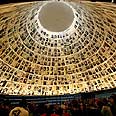
Yad Vashem. Not in Arabic
צילום: רויטרס
Yad Vashem: Why no brochure in Arabic?
Teacher at Arab-Jewish school tours Yad Vashem, shocked to discover there are no subtitles or even a pamphlet in Arabic – an official language in Israel. Manager of Holocaust museum in Nazareth: This is a type of Holocaust denial in face of Arabs. Yad Vashem explains Arabs simply fail to arrive
Idan Toeldano, a music teacher at the Jewish-Arab school "Bridge over the Wadi" has complained to the Yad Vashem Holocaust Martyrs' and Heroes' Remembrance Authority that "excluding the Arab language from Yad Vashem legitimized the exclusion of Israeli Arabs from other places in society."
Toledano visited the museum several months ago and was surprised to find explanations in many languages, apart from Arabic, an official language in Israel.
"At the entrance to the museum one can take pamphlets about the museum, which are translated to many languages. I did not find such a brochure in the Arab language. Inside the museum as well there are subtitles in Hebrew and in English, but not in Arabic.
"How can we bridge the difference between us and the Arabs if not through the issue of the Jewish pain during the Holocaust?" He wondered.
Following the visit, Toledano sent a letter to the Yad Vahsem management, in which he noted that "as the third generation of Holocaust survivors, I would like to expose the issue and to also present it to the State of Israel's Arab-speaking residents, as an inseparable part of the history of the Jewish people and as a milestone in the existence of the Israeli society.
He added that "the lesson from the Holocaust, a universal lesson, must be learned, and must be bequeathed to future generations. But the way to do this is through education, and this has direct connection to language."
In Yad Vashem's website as well there is almost no material in Arabic. In the links presented by the site one can find material in 13 languages (Hebrew, English, Hungarian, Czech, Flemish, French, German, Italian, Latvian, Polish, Romanian, Russian and Spanish), but not in Arabic.
It was recently published that the museum employees are working on translating a large part of the website to Arabic and Persian. Today, however, apart from a file in the Arabic language which answers questions on the Middle East and anti-Semitism, the issue has not been met yet.
Education Minister Yuli Tamir told Ynet that she had learned "that technically the museum cannot include more than two languages."
She was informed, however, that Yad Vashem was working to produce a vocal guide in the Arabic language, which will answer the needs of Arab visitors.
In addition, Tamir said that "the Yad Vashem school produced study material in Arabic and is making use of it as part of its activities with schoolchildren from the Arab sector."
'Holocaust studies could help solve conflict'
Knesset Member Nadia Hilou (Labor) responded to the issue, saying that in addition to the fact that the Arabic language is ignored as an official language in Israel, "reconciliation starts by each nation recognizing the pain and the history of the other people."The failure to provide explanations in Arabic does not only harm the Arab population, but simply causes the Holocaust not to be fully exposed to the Israeli Arab public."
Attorney Khaleed Mahameed, the operator of the Holocuast museum in Nazareth, believes that the Holocaust is the most sensitive point in the Israeli-Arab conflict.
"Israel and the Jewish people have not succeeded in explaining the Holocaust to the Arabs, and when Yad Vashem fails to offer explanations in Arabic, this in fact means that the Arabs are not invited to learn about the Holocuast.
"This is actually a certain type of Holocaust denial in the face of the Arabs," he charged.
Mahameed believes that the issue of the Holocaust can connect between the Jewish and the Palestinian people.
"If the Arabs had known about the Holocaust and studied about it, the Israeli-Arab conflict could have been solved a long time ago," he said.
Yad Vashem officials said in response, "The subtitles in the museum were prepared according to a key of supply and demand, and unfortunately the demand today from Arabic language speakers is low. Moreover, it is technically impossible to load more than two types of subtitles inside the museum."
The museum added that efforts were being exerted to draw the Arab sector to the museum, and that in the near future there will be a vocal guide in the Arabic language.
"The International School for Holocaust Studies in Yad Vashem produces study material on the Holocaust in the Arabic language and encourages visits by schools from the sector."










